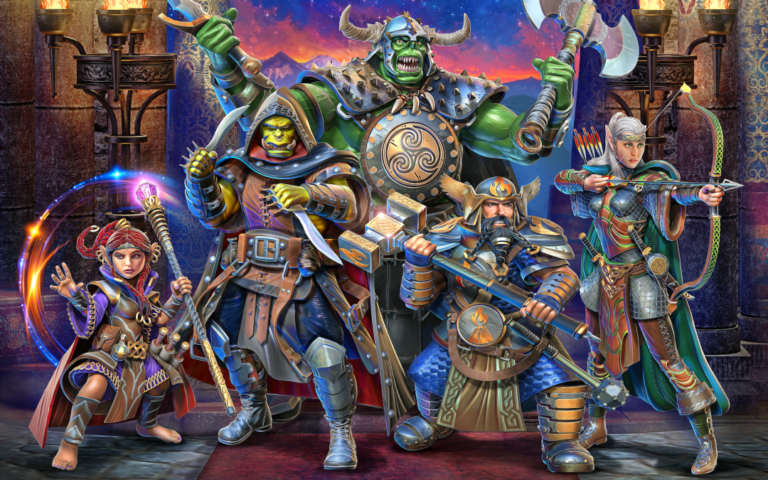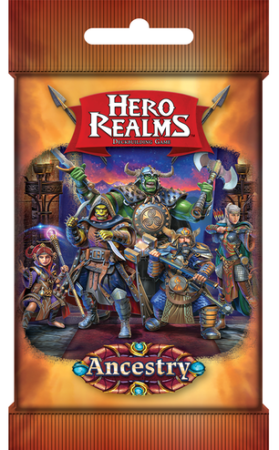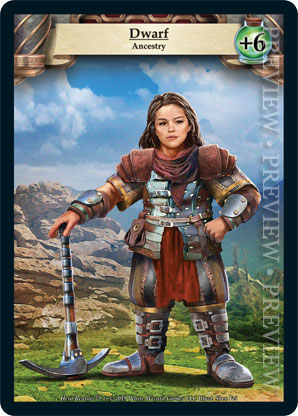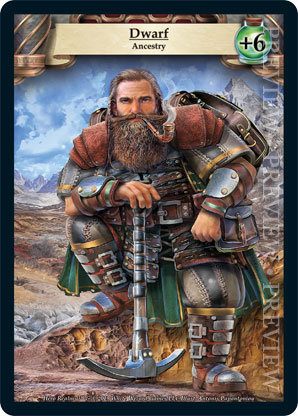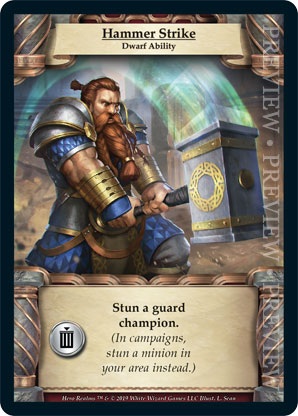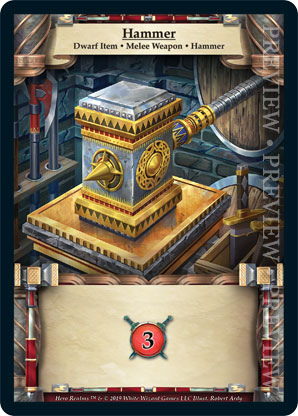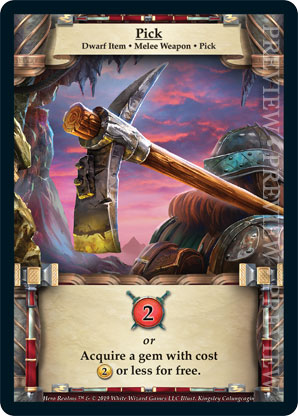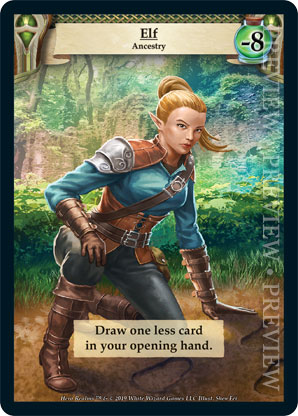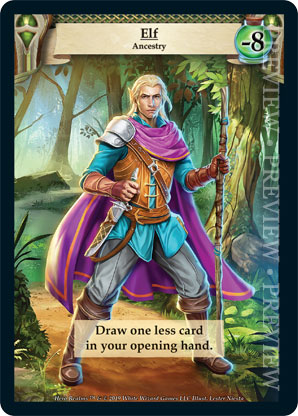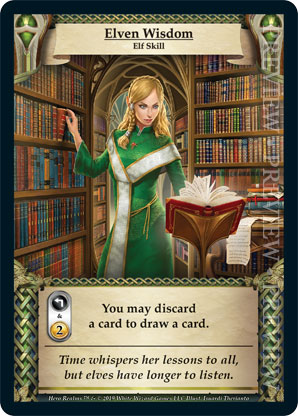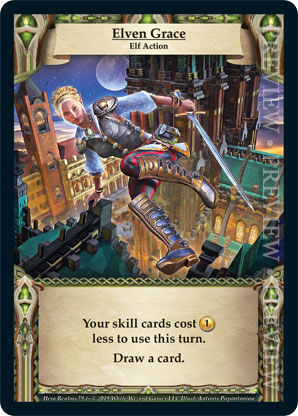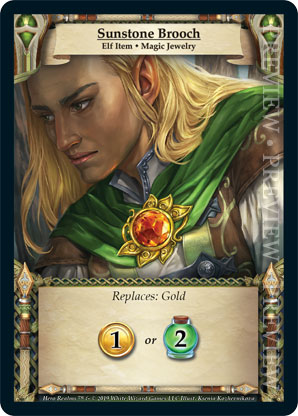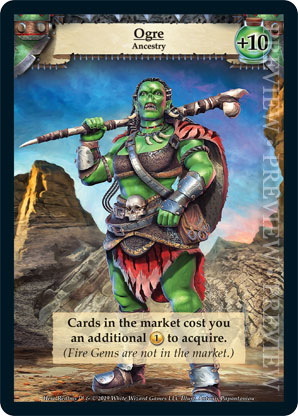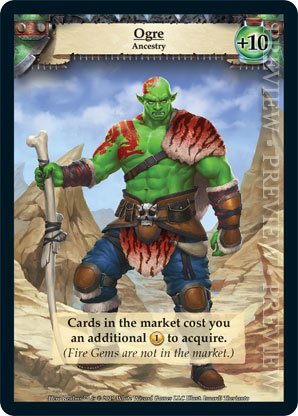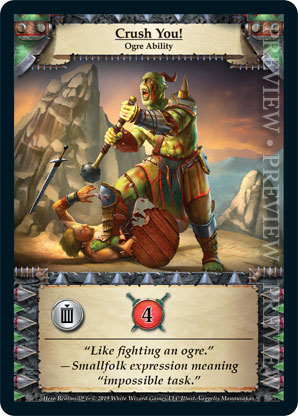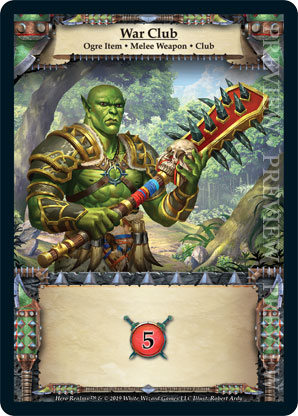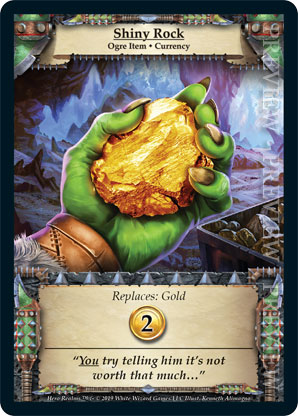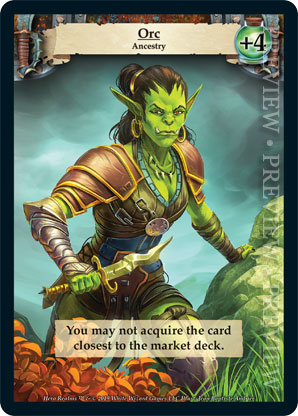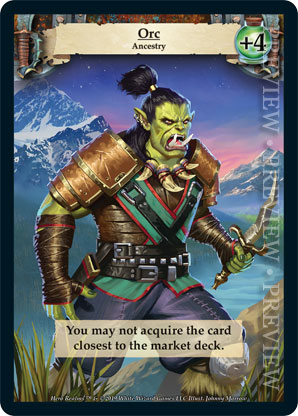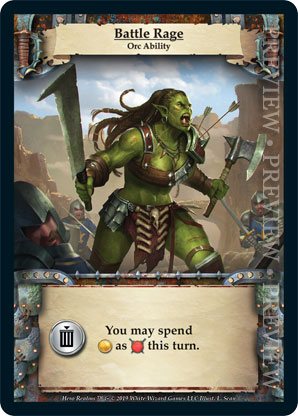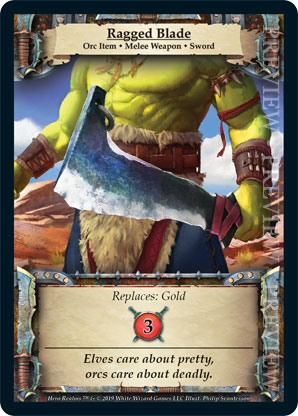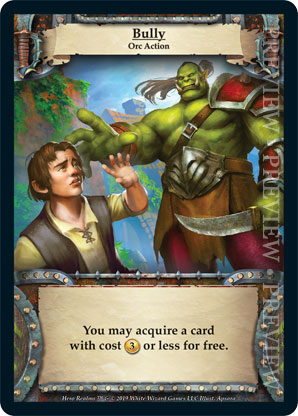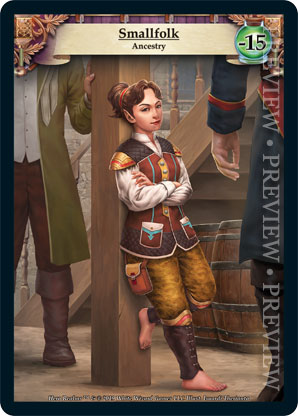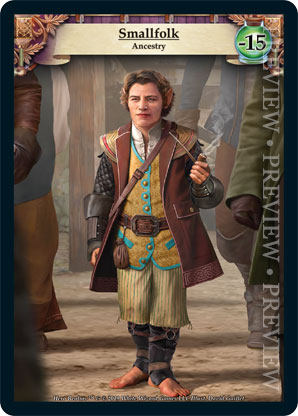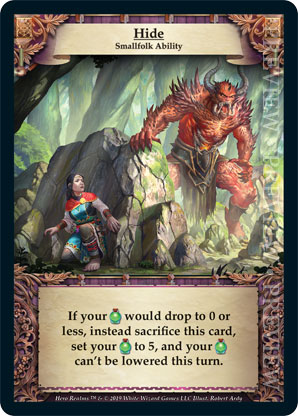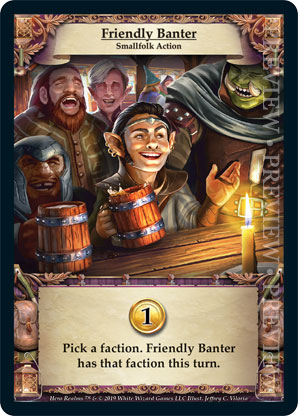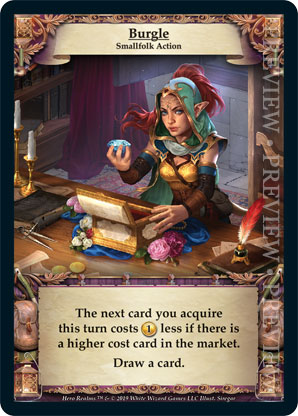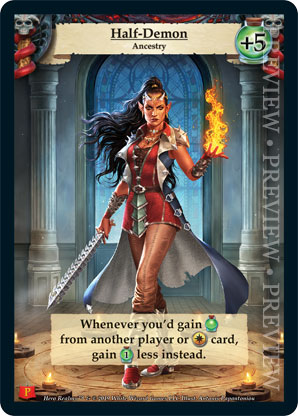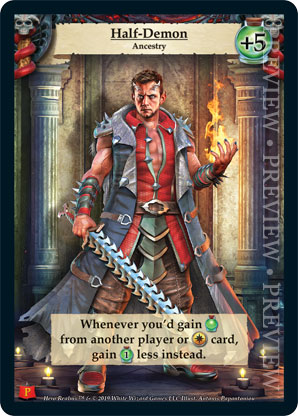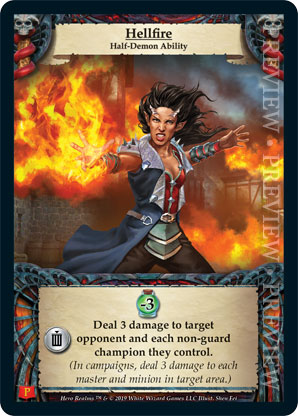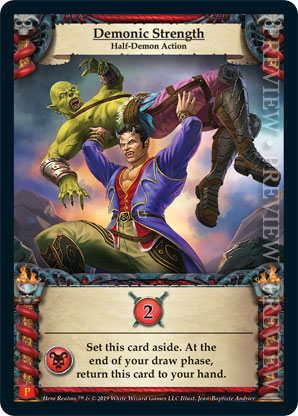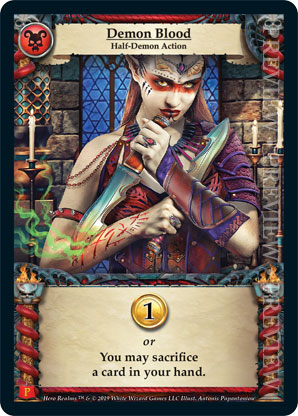During the Hero Realms Jouneys Kickstarter Campaign, Wise Wizard Games (WWG) made a – true to their name – very wise decision to bring forth an Ancestry addon.
In Hero Realms, Ancestry is basically a synonym for “race” or “kindred” and in the Ancestry pack are 5 different races with their own unique abilities. The races are Dwarf, Elf, Ogre, Orc and Smallfolk and these can be coupled with whichever class the player wants to try out in either PvP or PvE. In the kickstarter they also had a Kickstarter Exclusive Half-Demon and since players still have the option to ignore Ancestry and keep playing as human, this means that there are 7 different races in play! Coupled with the existing class builds, we now have thousands of possible builds per class and an incomprehensible number of possible matchups at max level! This is so exciting!
Each race comes with 4 cards that alter the hero in some way and as with the classes they consist of a mix of different mechanics.
- 1 Ancestry card that changes starting health and sometimes gives an additional effect.
- 1 skill/ability card that starts out on the table
- 2 cards that modify the starting deck of the hero
So the starting health is modified across all races and the range is actually pretty wide. With the Ogre adding 10 and the Smallfolk subtracting 15 health, the health modification alone completely changes the way we are used to think about each class and how we will have to play it – or against it! – going forward.
4 of the 6 races adds health to the hero, which could benefit anyone who struggle to be able to pull their deck together before dying. While all of the classes with lower starting health (Wizard, Thief and Cleric) have healing options in one way or another, it could prolong the window in which the hero is able to forego the gold needed for healing with their skill to buy into something else.
The 2 races that lower the hero’s health will obviously make it more difficult to play, but they come with their own rewards, as will be evident in a moment.
So let’s take a look at the possibilities!
Quick disclaimer: The cards in this article are the paper versions of Ancestry. The digital app is currently still balacing Ancestry and there have already been made changes to several of the ancestries. When balancing is done, I might change this article to reflect the more balanced versions of the cards.
Dwarf
The Dwarf is a sturdy race and it adds 6 points to a hero’s starting health with no additional effect.
Like the Ogre and Orc it also adds a second one-time-use ability. In this case the hero has the ability to stun a guard without using the damage to do so. There is no restrictions on this stun condition either, so like the Ranger’s Snake Pet, it can be used to stun any guard with any buffs. This is useful to most classes, but might especially benefit the Fighter, which has a hard matchup against the Cleric and therefore might need a little help. On the other hand it could also be useful to Clerics, which often struggle to have enough damage early on to counter the other classes’ champion-buying counter plays.
Its two starting deck cards are both items and doesn’t replace anything in the hero’s existing deck, which makes the deck cycle slower. On the other hand they add 5 possible damage, which just about doubles the damage in any class starting deck. On top of this, the Pick is versatile, meaning that the player can either choose to use its 2 damage or buy a Fire Gem for free – which let’s the player boost their economy early on and gives them extra damage, when it is no longer needed.
The added damage and gold from the weapons seems to again benefit the Fighter most, as that class has the lowest gold count in their starting deck and no way of boosting it through leveling. The Weapon classification synergizes with the Fighter’s Sharpening Stone and makes that more reliable while the added damage can speed up an aggro-fighter and can help a Cleric take down early champion walls. But because both cards are added to the starting deck, it also means more cards with no faction synergies and maybe a Ranger or a Wizard will have better luck at cycling through these items when they are no longer needed.
Elf
Instead of being strong and tanky, the Elf relies more on speed to protect themselves and the race therefore subtracts 8 points from the hero’s starting health. They also start each game at a slight disadvantage by drawing one card less in their opening hand. This seems to be worse when the player gets to start the game as this allows them to draw only two cards in their opening hand, but in any case it slows the Elf down just a little bit in regards to other races.
As the only race, the Elf has gotten a 2nd skill and not an ability to add to their toolkit. Elven Wisdom can be expended every turn if its price is paid and allows the player to discard a card to draw a card. This helps the player speed up their deck cycle, but only if they have excess gold lying around. Keep in mind that this skill also differs from the Wild faction’s cycle ability, as here you have to discard before drawing and not the other way around. Any class can benefit from faster deck cycles, but since the extra skill – like the class skill – will cost gold to use, it does seem to benefit classes which has good economy – like the Thief or Wizard.
The two starting cards focus on keeping the Elf’s speed high as one draws a card and the other replaces a gold, which means that neither card is slowing down its deck. The Sunstone Brooch is a little tame, but it does add a little health gain to the deck to make up for the health loss from picking the race. What is interesting though is the Elven Grace action which reduces the cost of all skills by 1 gold – making any class (but Ranger and Wizard specifically) able to cycle through their deck faster while still buying cards to put in it. Elven Grace is even an action, which makes the race even more attractive to Wizards.
Ogre
The Ogre is the biggest and baddest race in the mix and it adds 10 points to a hero’s starting health. The price of everything on the Market Row is also upped by 1 gold if the player has made their hero an Ogre – presumably because Ogres value other things higher than gold (see the flavor text on Shiny Rock). Even though Fire Gems aren’t part of the Market Row, this is a pretty serious disadvantage, which seems to favor economy-heavy classes like Thief and Wizard or maybe just an aggro-rush deck, where the player only buys a few choice cards. Its ability “Crush You!” certainly seems to lean towards the aggro-rush deck with its 4 straight damage.
The two starting deck cards are very similar to that of the Dwarf. It is also two items, but unlike the Dwarf, only one of these items is a weapon. The War Club does deal 5 damage though and the Shiny Rock ups the economy by adding 1 gold to the starting deck. And since it replaces gold instead of adding to the deck, it doesn’t slow down the Ogre’s deck as much. Like the Dwarf, the added gold and damage seems to favor the Cleric and Fighter most, but the ancestry disadvantage of a more expensive Market Row might cripple a hero that needs extensive deckbuilding, like the Cleric.
Orc
Next up is the Orc, which seems to add a good mix of ressources to any starting deck. First thing is first though. The Orc adds 4 points to the hero’s starting health, making it slightly more durable. But the Orc is apparently also a social paria, which means that an Orc hero no longer has the ability to buy the card closest to the Market (deck) – presumably for fear of being run off. It doesn’t truly hinder the Orc in their deckbuilding – but it does limit their available options to 4, which means that an Orc needs to be more versatile than other races. Its ability allows the Orc to convert excess gold to damage, which could be quite valuable in the late game, where economy is no longer as usable or even in the early game to take out an annoying champion. It also seems to make allowances for the Orc to buy further into economy than other races with fewer consequences.
Even its two starting deck cards lends at least a little versatility to most classes. One is the Ragged Blade which adds 3 damage in replacement of 1 gold – making an Orc hero more aggro than a Human one. It is also a weapon, which – like the Dwarf’s weapons – grants synergies with the Fighter’s Sharpening Stone. The other is the action Bully, which allows the Orc to buy a 3-cost card (or cheaper) for free. It isn’t nearly the same as a 3-gold economy boost, as this card can only be used to buy low-cost cards, but it still lends versatility in the early game and as an action, it grants synergies with the Wizard’s toolkit. One card even replaces a card in the starting deck, while the other adds – further walking that line between benefitting many classes just slightly.
Smallfolk
Smallfolk is by far the squishiest race in the mix as it subtracts 15 points from the hero’s starting health. It also differs from the other races with its ability, as it can’t be used at the player’s leasure, but is instead triggered when the hero would otherwise have died. It allows the Smallfolk to instead reset its health to 5 points and then go into hiding until their next turn – preventing any more damage that turn.
Both its new starting deck cards are added to the deck, but as Burgle draws a card it ensures that the Smallfolk’s deck isn’t slowed down too much. Burgle also allows the Smallfolk to buy a card at a 1-gold discount, as long as it isn’t the most expensive one on the market row. Friendly Banter adds a single gold to the starting deck – which normally is something you would want to avoid – but it also grants the hero the ability to choose a faction for Friendly Banter, which can then grant access to ally abilities that the hero might otherwise not have been able to trigger.
Both additions to the starting deck are actions, which seems to favor the Wizard with its Fire Staff for faster deck cycling. But Friendly Banter and Burgle honestly lends advantages to all classes, as anyone can benefit from additional factioning or discounts on cards in the market row. The downside of the Smallfolk race is of course the extremely low starting health and that seems to lend itself to heroes with either high starting health or healing abilities.
Half-Demon - Kickstarter Exclusive
The Kickstarter Exclusive Half-Demon is as mentioned before not part of the Ancestry pack, if you buy it now. It is however accessible in the Hero Realms digital app.
The Half-Demon adds 5 points to starting health, but is also limited in the amount of healing it is capable of receiving, as healing provided from Imperial (yellow) cards or from other players (when playing co-op) is reduced by 1 point. Healing done by a hero’s starting deck, skills or abilities is unaffected by this disadvantage though. Its ability leans further into the healing disadvantage, as using it reduces the Half-Demon’s health by 3 and then functions almost like the Wizard’s Fireball by dealing 3 damage to the opponent and non-guard champions.
Both cards to starting decks are added and none of them draws a card, which – at least in the beginning – will make the deck cycle slower for the Half-Demon. However it might pick up again later on, as both cards offers abililties to that effect. Demonic Strength offers the first starting deck ally ability – allowing it to be set aside instead of discarding it at the end of turn and making it usable multiple turns, so long as a Necros (red) card is also in play. The other card – Demon Blood – adds a single gold to the deck, but much as the Smallfolk’s Friendly Banter, it also grants an additional effect, as it allows the Half-Demon to sacrifice a card in hand instead. Neither of the two options are great on their own, but there is something to be said for the versatility of choosing one or the other.
Also like Smallfolk, both additions to the starting deck are actions – making the Half-Demon attractive to Wizards. But the sacrifice ability of Demon Blood could make a Cleric less dependant on the market row, while the repeatable damage of Demonic Strength might be attractive to Fighter or Ranger.
I think it is safe to say that Ancestry will forever change the dynamic of Hero Realms, whether one is playing PvP, co-op, paper or digital. I know that my physical gaming group hasn’t played with Human heroes since Ancestry arrived and with the Dungeons Kickstarter, we are already looking at 6 additional classes. The possibilities will soon be endless! Happy gaming!
